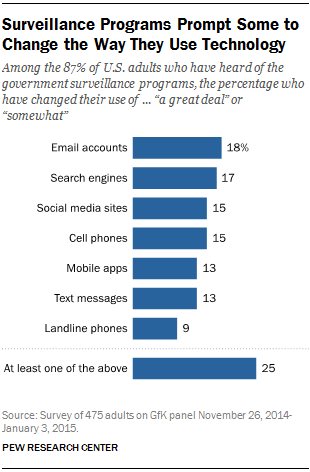When journalists began publishing classified NSA documents provided by former contractor Edward Snowden, it seemed as if the damning revelations about government spying would forever change Americans’ relationship with technology.
That does not appear to be the case, at least according to a new Pew Research Center survey of Americans and their digital privacy habits.
The report found that, while 87 percent of American adults knew about National Security Agency spying programs detailed in the Snowden files, only 34 percent of those informed people had changed their behavior at all in response to the news.
The most common area of change was in those people’s use of email, with search behavior a close second.
Unsurprisingly, the people most likely to alter their behavior were those who knew a lot about the government surveillance detailed in the Snowden leaks. While 25 percent of people who knew at least something about the leaks said they had made significant changes to their online behavior, that number grew to 38 percent for people who knew a lot about the leaks.
The Pew report’s other findings, however, are disheartening for online privacy advocates: 54 percent of Americans think it would be “somewhat” or “very” difficult to better protect themselves online, and 46 percent of people either don’t use or haven’t even thought about using email encryption software.
One silver lining: A quarter of Americans who knew about the Snowden leaks had switched to more secure passwords.
Photo via Tulane Public Relations/Wikimedia Commons (CC BY 2.0)



